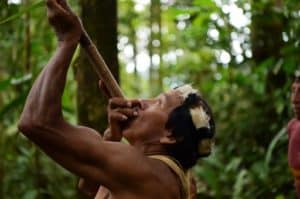Waorani Indians fight against oil exploitation
Waorani Indians fight against oil exploitation

The Waorani Indian Tiri Nenquimo uses a blowgun near Nemompare
© AFP RODRIGO BUENDIA
Nemompare (Ecuador) (AFP) - Poisoned spears and arrows are always on hand to deal with the invader. But this time, the Ecuadorian Waorani Indians rely on justice to prevent the invasion of their Amazonian lands by oil companies.
Hunting people, the Waorani consider themselves as the guardians of the Amazon rainforest, which covers several provinces of eastern Ecuador. "You want the oil companies to come to kill the forest, pollute clean territory and clear waters? Says Debanca, one of the village leaders of Nemompare, to an AFP team who went there.
About fifty Waorani Indians live in this village located in the forest on the banks of the Curaray River. Most live naked, others are dressed in shorts and shirts.
To reach Nemompare, 40 minutes of flight by small plane are needed from Shell 150 km from Quito. The locality has adopted the name of the European oil multinational established for nearly a century in the state of Pastaza, and become a symbol of the penetration of mining activities in the Amazon.
With other Waorani, the villagers of Nemompare decided to resort to justice to prevent the arrival of the companies on their territory.
Friday, a court of Puyo, the capital of the state of Pastaza, must deliver its judgment in the first instance, starting point of a judicial battle that looks long.
The exploitation of oil has been one of the pillars of the Ecuadorian economy since the 1970s, but it has left traces of destruction still visible in the forest: contaminated water sources, mountains of waste, disappearance of wildlife ...
In Nemompare, the Waorani store rainwater for their consumption, have access to electricity through solar panels and sleep in hammocks. They learned to write with "kowori" (foreigners), but they cling to their language, wao terere.
Sitting in a hut, Wiña Omaca illustrates the spirit of resistance that animates his people. "The tapaa (spears) are ready, but also the campa (machetes) and the aweka (axes)," she enumerates.
Property of the basement
Nobody dares to talk about war, but these Indians could turn their territory into a hostile zone for oil companies.
"We defend our forest, our culture and the right to live our lives," explains Nemonte Nenquimo, president of the Waorani Council of Pastaza (Conconawep), who initiated the legal proceedings.
The Waorani (4,800 people) own 800,000 hectares of forest in the states of Pastaza, Napo and Orellana. Ecuadorian law recognizes their property rights, but the state retains the rights of the subsoil.
A month ago, the Conconawep filed a petition to demand that part of the Waorani territory, 180 000 hectares of forest (1% of Ecuadorian territory), be excluded from a future petition.
The government claims to have been given the green light to launch this tender after the organization, in 2012, of a Waorani consultation as required by the Constitution. For their part, the Indians claim to have been deceived by the officials who came to question them.
For now, the fight is going on in court, but the history of the Waorani is crossed by violent episodes that make fear their reaction. Two nomadic clans, Taromenane and Tagaeri, who live in voluntary isolation, have sometimes clashed to death in the depths of the forest.
"They do not have a friendly relationship," Miguel Angel Cabodevilla, a Spanish missionary, told AFP after spending thirty years with the Waorani.
Loggers, who had used weapons to settle in part of their territory, were also the target of the Waorani spears. But "the violence is mainly between them," says Cabodevilla.
"Their lands were taken from them, persecuted and killed, enslaved, and now their basements are used without adequate compensation," said the missionary.
After decades of violence and manipulation by governments, oil companies, rubber companies and loggers, the Waorani have become very suspicious.
Peke Tokare, a "pekenani" (sage) whose earlobes are enlarged by wooden discs, points to the slogan written on his shirt: "Monito ome goronte enamai" (Our territory is not for sale) .
© AFP




No comments